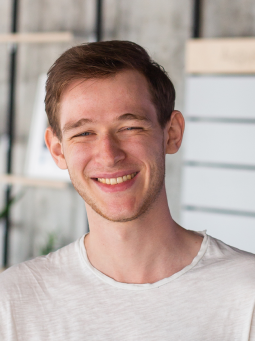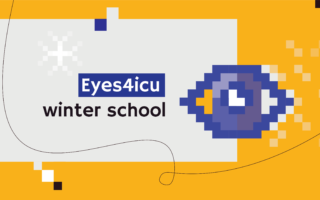What's
Summer school from DeepMind: the one you shouldn’t miss if you are in the machine learning field
Matej Čief is one of our PhD students. He is a member of the Web & User Data Processing team where he focuses on recommender systems. At the beginning of the summer, Matej attended the EEML Summer School. Read on to find out more about his experience.
This summer I had the chance to participate in the 4th edition of Eastern European Machine Learning Summer School. With participants from all over the world, chances were high that you would find someone with the same interests. I flew to Vilnius, the capital of Lithuania, took part in this summer school, and I am going to share some insights with you.
The summer school was organized by DeepMind, with speakers from Google, OpenAI, Microsoft, MIT, Harvard, Oxford and many more renowned organizations.
The topics span from deep learning all the way down explainability, causality, Bayesian statistics, and reinforcement learning. You could listen to the talk from the creator of DALL·E 2 or learn more about the increasingly popular Graph Nets by the Google Research scientist Thomas Kipf. My favorite was the great tutorial for causality.
Networking
Let’s begin with the most important and also most fun part of the whole event, and that is the get-together of new like-minded people. People here were not only smart, they were SUPER SMART, driven, knowledgeable and really funny.
I met PhD students from top universities like Stanford and Cambridge, with industry and institute affiliations, such as Criteo and The Institute of Cancer Research.
Not all of the participants were PhD candidates though. There were managers striving to do data science, machine learning engineers, and even undergraduates interested in ML. Networking is one of the best ways to get into the new field.
I’d like to give you some examples of my interactions that have been influential to me.
I do research in off-policy optimization for recommender systems. I have met Houssam, a guy doing an industry PhD degree in Criteo, working in the field of offline and online bandits. He is currently in his third year and has 1000+ citations according to Google Scholar. He asked me: “And what about you, Matej? What are you working on?” I quietly whispered “Offline bandits”, intimidated by being in front of a much more successful researcher in the same domain. But Houssam was super excited about that. “Really? Tell me more!” Afterwards we spent the whole lunch talking about our work, a lot of exciting ideas came out of it and we may collaborate in the future.
I had another influential talk with Filip. Filip did his PhD at Cambridge in mathematics, category theory. Now he is a math and physics high school teacher north of London, where Stephen Hawking went as a kid. I have a technical background and I sometimes struggle with math in my research.
Filip gave me some really great tips that will help me in situations when I suddenly need to understand too much math for my technical background. Filip explained to me that it is more about developing intuition, no need to go deep into technicalities of most things. The important thing is to comprehend the concepts math brings. It is also important to see the concrete applications and use them as an anchor, as the math itself is quite abstract.
Another practical tip was not to read the whole textbook. It would be inefficient at my point and I would probably forget most of it anyway. Youtube videos are better for explaining unknown concepts than wikipedia.
Finally, I met Matej (spelled the same as my name, pronounced differently), a 2nd year PhD student at TU Darmstadt. The positive energy and excitement he has for almost anything brings me to appreciate what I have, how lucky we are to be living in this world and to do what we truly love and how many opportunities we have.
School program
Organizers were simply amazing. Lectures were top-notch, you had a lot of time for discussions and asking questions. Between the lectures there was time to grab a bite and interact with other participants.
Apart from the lectures, we had poster sessions where I presented my research on Off-policy Learning for Structured Recommendations. There were tutorials, paper reading sessions, and panel discussions on interesting topics, such as ML Career Advice.
Free time activities were organized almost every evening, for example a guided tour and a banquet. If you would like to read more about the program, you can find the details on this page.
Overall, this was one of the best experiences of my life. It was eye-opening to see so many brilliant young people that are living examples of how much can be achieved. I left the summer school with new friends, knowledge, motivation and ideas. I also expanded my network for potential future collaborations.
If you are interested in ML at whatever level or position, this is a must-go event for you. Follow EEML Twitter so you do not miss the next year.


